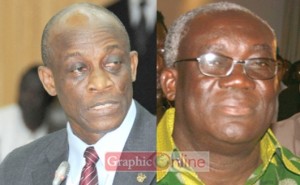Warning: Undefined array key "dirname" in /home/anapuafm/public_html/wp-content/themes/anapuafm/include/plugin/filosofo-image/filosofo-custom-image-sizes.php on line 133
Warning: Undefined array key "extension" in /home/anapuafm/public_html/wp-content/themes/anapuafm/include/plugin/filosofo-image/filosofo-custom-image-sizes.php on line 134
Gov’t refutes TUC claims of economic mismanagment
 The government has refuted recent claims made by the Trades Union Congress (TUC) on Ghana’s economy.
The government has refuted recent claims made by the Trades Union Congress (TUC) on Ghana’s economy.
On February 5,2014, the TUC issued a statement, titled “The General Economic Situation in Ghana”, in which it accused the government of ignoring the union’s advice for a national dialogue and consensus building on the nature of economic policy and economic management.
Counter Statement
The Ministry of Finance, in a counter statement issued on Wednesday, said the government had consistently engaged the TUC and other stakeholders in designing policies and measures for the effective management of the economy.
“In as much as not all submissions from all stakeholders can be taken on board, the budget and the medium- term policy framework benefit significantly from these inputs,” it said.
On the TUC’s accusation of the government for relying on economic policy advice of ‘experts’ at the International Monetary Fund (IMF) and the World Bank (WB), thereby leading to the implementation of neo-liberal economic policies over the past three decades, it said, “We reject the claim that the government relies solely on the IMF and the WB for its economic policies.”
The government’s economic policies, it hinted, were informed by contributions from various stakeholders, including the TUC, domestic policy think-tanks, civil society organisations (CSOs), development partners and international investment and financial institutions.
It pointed out that the country had, since 2012, not been on an IMF programme and for that matter all economic policies currently being implemented had been home grown.
Intervention Programmes
According to the statement, the TUC statement sought to give the impression that the economy had been ! weaker and not undergone any structural changes in the past three decades.
“This is definitely not the case, as anyone who was familiar with the state of the economy in the 1970s will testify that the Ghanaian economy today has made significant progress,” it said.
The statement, which listed a number of intervention programmes in areas such as education, health and energy, noted that the government saw the increases in VAT and other fees as prudent fiscal measures aimed at creating the needed fiscal space to accommodate the increasing infrastructure needs to sustain the Trade policy
On the TUC’s assertion that Ghana’s trade policy was too liberal and penalised domestic operators, it said the government was committed to promoting industrialisation and creating the environment for industry to thrive.
“In spite of the benefits trade liberalisation provide, we are mindful of the ill-effects of unbridled liberalisation,” it said.
The TUC had also asserted that the government’s economic policies had not inured to the well-being of Ghanaians, as there had not been poverty reduction and employment generation.
“This assertion is not supported by data,” the statement said
It explained that the economy had grown consistently over the past five years, with average growth exceeding eight per cent.
On calls for a significant upward adjustment in wages to cushion workers against the current economic hardship, the statement said increasing the wage bill above sustainable levels would result in sub- optimal outcomes which the TUC was advising the government against.




